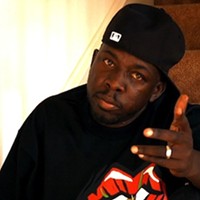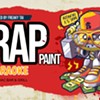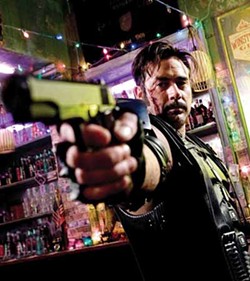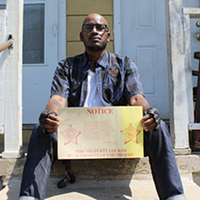Page 2 of 3
All in all, Watchmen was probably the most successful attempt to create a superhero comic that was adult in both content and narrative construction. So how did this history-making comic come together in the first place? Read on ...
A brief history
As I previously mentioned, Watchmen was written by the British-born writer Alan Moore. A few years earlier, Moore gained some popularity in America for revitalizing the down-right wack Swamp Thing for DC. Actually, you couldn't call what he did with the Swamp Thing comic "revitalization" because it was such an awful character and series; for all intents and purposes, he "remixed" Swamp Thing and became a star in the process. He went on to write several other acclaimed comics before coming up with the idea for Watchmen.
Initially, Moore wanted Watchmen to star a group of rather well-known characters DC had just purchased from a now-defunct comic company called Charlton Comics (including Captain Atom, The Blue Beetle and The Peacemaker, among others). Officials at DC were all for it at first. But after getting wind of the full story, they weren't willing to let Moore screw up some heroes that cost them an ass-load of moolah (the whole erectile dysfunction thing undoubtedly freaked them out).
After hearing that DC was not giving him the Charlton characters, Moore was disappointed. But it didn't take him long to figure out that the story would work better with brand-new creations, instead of heroes weighed down by decades of continuity. So he made up his own super dudes and away he went.
Now, I remember reading Watchmen when it came out back in the day -- I remember being blown away by it, too. Everyone was blown away by it. Unlike some great works of art, it was immediately appreciated by fans and critics alike. No one had ever seen such a mature depiction of superhero mythology. And it wasn't long before it influenced a whole new crop of creators -- and not in a good way ...
The legacy of Watchmen
The success of the Watchmen series should have birthed a new age of literate and thought-provoking comics -- and it did ... sort of.
Some creators attempted to step up their game and make more challenging and artistic works. But most, instead of swiping the weighty aspects of the series (the symbolism, storytelling techniques or even the sheer awe of the art and writing), absorbed the more prurient elements in Watchmen. As a result, the industry was flooded with a new wave of comics filled with violence and contempt for the spandex-clad heroes of the past. The 1990s was a decade of comics with "dark" heroes -- guys with mental problems who carried big guns and weren't afraid to blow a villain's brains out. That wasn't exactly what Moore was trying to do to the comic industry. In 2003, he said in an interview: "[T]o some degree there has been, in the 15 years since Watchmen, an awful lot of the comics field devoted to these grim, pessimistic, nasty, violent stories which kind of use Watchmen to validate what are, in effect, often just some very nasty stories ..."
Ouch. But he was telling the truth.
So what happened next? Well, good things and bad things ...
No more Moore
Yes, Watchmen made DC a ton of cash, but the company pissed off Moore. He was under the impression that the rights of the series would revert back to him and Gibbons after a while, but, as he understood it, that was not the case. As a result, Moore felt swindled and vowed never to work for DC again. And he didn't ... sort of. He created a line of books -- called America's Best Comics -- for a DC subsidiary called Wildstorm. While writing the ABC line, he created a series called The League of Extraordinary Gentlemen, which was later made into a sucky movie. (But the comic was great.) And while we're on the subject of movies, I should probably mention that Moore hates the idea of his comics being turned into films. He's a comic purist and creates work specifically for the medium. To that end, he hasn't made money off the films directly -- he lets his collaborating artists (like Gibbons) take his own share of the proceeds.
Eventually, he stopped writing for the ABC line and for DC and all its subsidiaries for good. He currently does work for a small, indie publisher called Top Shelf.
Still, his influence on mainstream comics -- and mainstream America -- lives on. Several of his other comic works, such as V For Vendetta and From Hell -- have been made into films. And a critically acclaimed writer by the name of Neil Gaiman (the guy behind comics such as Sandman, novels like American Gods and the current hit film Coraline) cites Moore as the sole reason he got into writing comics.
Latest in Cover story
More by Carlton Hargro
-

The secret origin of rising comic star Jason Latour
May 21, 2014 -

Interview: Chatting with The Foreign Exchange
Aug 30, 2011 -

Phife of A Tribe Called Quest hits the Q.C. Aug. 31
Aug 30, 2011 - More »
Calendar
-
An Evening With Phil Rosenthal Of "Somebody Feed Phil" @ Knight Theater
-
Kountry Wayne: The King Of Hearts Tour @ Ovens Auditorium
-

NEW WINDOW GALLERY-Pat Rhea-ACRYLIC PAINTINGS-April 05-30 2024 VALDESE, NC 28690 @ New Window Gallery/Play It Again Records
- Through April 30, 12 p.m.
-

Trap & Paint + Karaoke @ Zodiac Bar & Grill
-

LIVE MUSIC FRIDAYS!!! @ Elizabeth Parlour Room
-
Holiday Gift Guide
26 ways to shop local this holiday season
-
Fall Guide: Upcoming festivals, comedy shows, visual arts events and more
-
Charlotte Film Festival Features Distinct and Different Voices
Diversity and discovery hit the big screen











